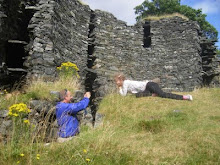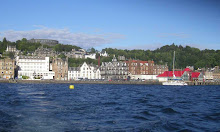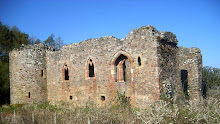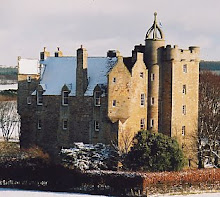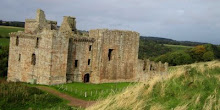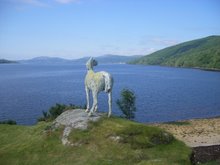Home yesterday after a great trip to the USA but, due to volcanic ash, eight days later than scheduled. My distraction as I travelled (and waited) was a book from a second-hand bookshop in Kennett Square, Pennsylvania: '1776' by David McCullough, a remarkable account of the tough campaigning of that year - first steps on the road to a United States of America.
I'm sure numerous people have made the connection between George Washington's brave but ill-equipped army and that of Prince Charles Edward who had faced the same enemy thirty years earlier in an attempt to recover the throne for the Stuarts. Both armies were short of money, food, equipment, gunpowder, cavalry, artillery, just about everything. Both leaders appealed to the hearts and loyalty of their soldiers, both suffered from desertion by those who felt they should be tending their crops. The main difference, of course, was in the generalship: Washington may occasionally have been indecisive but, unlike Bonnie Prince Charlie, he was a natural leader who was prepared to listen to advice.
Washington, who struggled to keep the Yankees, the New Englanders and the Virginians together, would have been appalled at the three day horror which was Gettysburg. I spent a fascinating day there and was struck by the statistic that total casualties at Gettysburg were more than three times larger than the total combatants at Culloden.
Returning to Newark we crossed the Delaware at Trenton, where a brilliant Christmas Eve night manoeuvre by Washington changed the course of the war. Charlie's last-throw night march on the eve of Culloden similarly expected to find the enemy drunk. But the Highland Army arrived when the porridge was already on the boil, and they returned to camp exhausted.
When I am next at Culloden I will be much better able to answer questions from American visitors who are looking for familiar yardsticks for the history they are learning in Scotland.
Saturday, April 24, 2010
Monday, April 12, 2010
Vatted Whiskies of the 19th and 21st Centuries
 I have written before about Usher's Old Vatted Glenlivet - and proudly so, since Andrew Usher after whom it is named, happens to be my Great Grandfather. I explained then that the much used phrase 'single malt' is relatively meaningless nowadays since the days of vatted malts (a blend of malt whiskies) are long gone. Vatted malts were a great idea in the 19th century when independent (and recently legalised) distilleries across the Highlands produced wildly different products - some light and fiery, others heavy, peaty and a bit like cough mixture. Andrew Usher (amongst others) combined these different whiskies to produce a drink that was acceptable to the southern market. Nowadays malt whiskies differ, but all are more than palatable in their own right.
I have written before about Usher's Old Vatted Glenlivet - and proudly so, since Andrew Usher after whom it is named, happens to be my Great Grandfather. I explained then that the much used phrase 'single malt' is relatively meaningless nowadays since the days of vatted malts (a blend of malt whiskies) are long gone. Vatted malts were a great idea in the 19th century when independent (and recently legalised) distilleries across the Highlands produced wildly different products - some light and fiery, others heavy, peaty and a bit like cough mixture. Andrew Usher (amongst others) combined these different whiskies to produce a drink that was acceptable to the southern market. Nowadays malt whiskies differ, but all are more than palatable in their own right. And so it was with some surprise that I found at 'Whisky Live' (part of Scotland Week in New York) last week nothing less than a new range of vatted malts. They are produced by the Compass Box Whisky Company of Edinburgh. I had a taste of their 'Spice Tree' which was excellent. I am also intrigued by Lady Luck (pity it costs £125!). This type of blending is very sophisticated and a great addition to the whisky story. Good luck to them!
And so it was with some surprise that I found at 'Whisky Live' (part of Scotland Week in New York) last week nothing less than a new range of vatted malts. They are produced by the Compass Box Whisky Company of Edinburgh. I had a taste of their 'Spice Tree' which was excellent. I am also intrigued by Lady Luck (pity it costs £125!). This type of blending is very sophisticated and a great addition to the whisky story. Good luck to them!As an addendum, the Scottish whisky blenders - Andrew Usher, John Dewar, Arthur Bell, Johnnie Walker and others - really made their fortune as a result of the Great French Wine Blight. In the mid nineteenth century on verandahs throughout the world (and certainly in the USA) gentlemen were accustomed to drinking a brandy and soda before dinner. When the blight meant no french brandy a vast new market opened up for the whisky blenders from Scotland.
Aye, it's an ill wind...
Thursday, March 11, 2010
Why did Charlie want to go to Skye anyway?

Speed, bonnie boat, like a bird on the wing,
Onward! the sailors cry;
Carry the lad that's born to be King
Over the sea to Skye.
There are two big clans on Skye - the MacDonalds and the MacLeods. When guiding out there I'm oddly reluctant to reveal that neither one supported the Jacobites in 1745, indeed that both chiefs signed up to support the government. Bonnie Prince Charlie arrived on Skye on 29 June 1746, disguised as Flora MacDonald's
arrived on Skye on 29 June 1746, disguised as Flora MacDonald's maid, piloted by Donald MacLeod of Galtrigal. One of the men tasked to search for him was the 22nd Chief of Clan MacLeod; another was Lieut. Alexander MacLeod of Talisker who commanded the local militia (and dined with Flora at Monkstadt on the night she arrived on Skye!).
maid, piloted by Donald MacLeod of Galtrigal. One of the men tasked to search for him was the 22nd Chief of Clan MacLeod; another was Lieut. Alexander MacLeod of Talisker who commanded the local militia (and dined with Flora at Monkstadt on the night she arrived on Skye!).
So why on earth did Charlie want to come to Skye? In short, government troops were closing in on him too fast on South Uist...where one of those meant to be searching for him was Flora's stepfather, Hugh MacDonald of Armadale, who was actually in on the plot to save him! It's complicated. Although the chiefs, and perhaps most men, were prepared to put their backs into finding Charlie (hoping to claim the reward of 30,000 guineas if they succeeded), there were enough loyal individuals to ensure his safety.
You see. Like everything to do with the Jacobites, it's complicated! But Pauline, our wonderful Clan Tour guide, will make it all seem quite simple!
Saturday, March 06, 2010
MacThomas Clan and the Tax Gatherers
I have been doing a little research on The MacThomas Clan. It's a sad (but not uncommon) story of a clan so rooted in their lands that they ignored what was going on in distant places such as Edinburgh. They were successful cattlemen at the start of the 17th century but they had their enemies, and in 1676 the MacThomas lands in Glenshee were sold as a result of law suits and fines for not paying fines.
The MacThomases who also briefly owned Forter estate in Glenisla (including its then ruined castle) dispersed throughout Scotland and the traditional lands were abandoned. However the present chief, Andrew MacThomas of Finegand is, unlike his ancestors, at home in the world of money and was a successful banker. He has recently presided over the purchase for the MacThomas Society of their traditional Gathering Place, Clach na Coileach or 'Cockstane (above); and the new bridge at the Spittal of Glenshee has been named after the clan. Finegand (as he should be addressed) has also written a history of the clan which was launched at The Gathering in Edinburgh last year.
 And if you wonder where 'Finegand' comes from, it is a corruption of the Gaelic feith nan ceann, meaning burn of the heads. It seems that the Earl of Atholl sent some particularly officious tax gatherers across to Glenshee and the MacThomases took exception to this. They used their dirks and tossed the taxmen's heads into a nearby burn. Perhaps that is what is being conveyed by the clan crest.
And if you wonder where 'Finegand' comes from, it is a corruption of the Gaelic feith nan ceann, meaning burn of the heads. It seems that the Earl of Atholl sent some particularly officious tax gatherers across to Glenshee and the MacThomases took exception to this. They used their dirks and tossed the taxmen's heads into a nearby burn. Perhaps that is what is being conveyed by the clan crest.
Would that it were that easy to deal with officious officialdom nowadays!
The MacThomases who also briefly owned Forter estate in Glenisla (including its then ruined castle) dispersed throughout Scotland and the traditional lands were abandoned. However the present chief, Andrew MacThomas of Finegand is, unlike his ancestors, at home in the world of money and was a successful banker. He has recently presided over the purchase for the MacThomas Society of their traditional Gathering Place, Clach na Coileach or 'Cockstane (above); and the new bridge at the Spittal of Glenshee has been named after the clan. Finegand (as he should be addressed) has also written a history of the clan which was launched at The Gathering in Edinburgh last year.
 And if you wonder where 'Finegand' comes from, it is a corruption of the Gaelic feith nan ceann, meaning burn of the heads. It seems that the Earl of Atholl sent some particularly officious tax gatherers across to Glenshee and the MacThomases took exception to this. They used their dirks and tossed the taxmen's heads into a nearby burn. Perhaps that is what is being conveyed by the clan crest.
And if you wonder where 'Finegand' comes from, it is a corruption of the Gaelic feith nan ceann, meaning burn of the heads. It seems that the Earl of Atholl sent some particularly officious tax gatherers across to Glenshee and the MacThomases took exception to this. They used their dirks and tossed the taxmen's heads into a nearby burn. Perhaps that is what is being conveyed by the clan crest.Would that it were that easy to deal with officious officialdom nowadays!
Thursday, February 25, 2010
The Braemar Gathering
'Always the first Saturday in September'. The Braemar Gathering is one of the constants of Highland Life. It was reputedly started by King Malcolm III (who replaced MacBeth as King of Scots in the 11th century), but the first modern day games was held in 1832.
 'Gatherings' or Highland Games were arranged by clan chiefs to display the prowess of their fast runners, strong men, pipers and dancers. It was also a good way of distracting their attention from moonlit raids on neighbouring clans' cattle. Clan Gatherings were banned by the government in 1746 following Bonnie Prince Charlie's 1745 Rising. But less than 100 years later Queen Victoria graced the Braemar Gathering with her presence - and Royalty have been attending ever since.
'Gatherings' or Highland Games were arranged by clan chiefs to display the prowess of their fast runners, strong men, pipers and dancers. It was also a good way of distracting their attention from moonlit raids on neighbouring clans' cattle. Clan Gatherings were banned by the government in 1746 following Bonnie Prince Charlie's 1745 Rising. But less than 100 years later Queen Victoria graced the Braemar Gathering with her presence - and Royalty have been attending ever since.
I was asked today why our Small Group Clan Tour was taking place in September. The answer is simple: we would like our clients to enjoy the Braemar Gathering - unique, royal and ancient.
 'Gatherings' or Highland Games were arranged by clan chiefs to display the prowess of their fast runners, strong men, pipers and dancers. It was also a good way of distracting their attention from moonlit raids on neighbouring clans' cattle. Clan Gatherings were banned by the government in 1746 following Bonnie Prince Charlie's 1745 Rising. But less than 100 years later Queen Victoria graced the Braemar Gathering with her presence - and Royalty have been attending ever since.
'Gatherings' or Highland Games were arranged by clan chiefs to display the prowess of their fast runners, strong men, pipers and dancers. It was also a good way of distracting their attention from moonlit raids on neighbouring clans' cattle. Clan Gatherings were banned by the government in 1746 following Bonnie Prince Charlie's 1745 Rising. But less than 100 years later Queen Victoria graced the Braemar Gathering with her presence - and Royalty have been attending ever since.I was asked today why our Small Group Clan Tour was taking place in September. The answer is simple: we would like our clients to enjoy the Braemar Gathering - unique, royal and ancient.
Subscribe to:
Comments (Atom)
















































